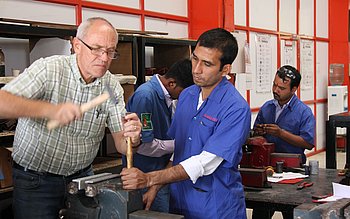Staying active in retirement – as a volunteer Senior Expert

Hartmut Stichel
At the beginning of the Seventies, when I had just qualified as a toolmaker, I was able to gain my first experience in the field of development cooperation by serving as a development worker for the DED (German Development Service) in Tanzania. During my professional career, I was able to work for a total of 14 years in various projects and with various organisations in Peru and Ethiopia and, most recently, as a Bread for the World development worker, in Rwanda.
During this time, I have gained formative experiences and lasting impressions of work, everyday life, and the complexities of development policy in an intercultural context. I learned a lot, not only about countries and cultures which had been foreign to me, but also about myself.
When I completed my last assignment, I went straight into retirement, but not without looking for ways in which I could put my life experience and work experience – and the skills and competencies which I had acquired through working in the field of development cooperation – to good use during my retirement. As I was searching the Internet, I came across the Senior Expert Service (SES), a not-for-profit organisation based in Bonn, which finds retired professionals for short-term voluntary assignments.
The agency was born out of the idea that expertise which has been built up over decades should not go to waste. Senior Experts are deployed for a minimum of three weeks and up to a maximum of six months.
This was exactly what I was looking for. I got myself registered at the SES with my personal and professional profile and was soon able to prepare myself for my first four-month assignment in India. I went there to support the Chamber of International Commerce in Pune, which was planning and then running a three-month basic training course in metalworking. The course was based on the German dual vocational training system and was run in cooperation with local industry.
Thanks to the success of this project, I received another invitation the following year to assist with a one-year advanced course. And I’m now looking forward to working as an SES Senior Expert for a third time in the same project.
In addition to these assignments in India, I have also been deployed on shorter assignments in Ghana, Argentina, Mexico, and China. Although vocational training was sometimes the primary focus, at other times I was involved in finding practical solutions to technical problems.
I’m now on a two-month assignment in Rwanda, where I’m involved in problem solving in relation to the coordination of training and production in a church context.
I’m not the only one to have benefited a great deal from all these assignments. A lot of positive feedback and personal contact with the projects have given me the clear impression that these short assignments have also had a positive impact on the partner organisations. So I hope to be able to carry out exciting tasks like this for many more years to come.
And by the way, the SES now offers short-term volunteer assignments to younger people (over 30 years of age) as well. Detailed information can be found at www.ses-bonn.de.
Hartmut Stichel lived in Tansania from 1973 to 1975, in Peru from 1979 to 1981, in Tansania from 1998 to 2000, in Ethopia from 2006 to 2008 and in Ruanda from 2009 to 2013 (published in transfer volume 2/2017)
